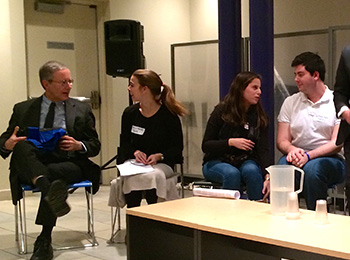TORONTO — The anti-Zionist campaigns at university campuses in the United Kingdom and Europe as well as North America may be more bark than bite, according to Derek Penslar, a Jewish studies professor at both the University of Toronto and the University of Oxford.
Nevertheless, the exposure of Jewish students to anti-Zionism campaigns is very difficult, he told a panel discussion last week attended by about 75 people at U of T’s Wolfond Centre. “There’s no doubt for students who identify with Israel, most universities are challenging places. There’s a disproportionate and obsessive attention paid to Israel on many campuses.”
Penslar’s speech was followed by a roundtable discussion about anti-Zionism and anti-Semitism encounters of GTA students currently attending Toronto universities. The Nov. 20 event was organized by JSpace Canada and Hillel of Greater Toronto.
While Israel is the focus of much criticism – which is particularly strong at campuses in Europe and Great Britain – Penslar cautioned against equating this sentiment with anti-Semitism.
He also said the boycott, divestment and sanctions (BDS) movement, the global economic boycott of Israel, doesn’t have much traction among academics at universities on either side of the Atlantic.
He pointed out that of U of T’s 2,000 professors and lecturers, there are only 14 BDS signatories – six are faculty members and the rest are graduate and post-doctoral students.
Similarly there are only 15 BDS signatories – half are graduate students – out of the 3,000 staff and faculty members at Oxford.
Academics at both universities are not preoccupied with Israel, Penslar said. “Most faculty members don’t wake up in the morning and think about anti-Semitism.”
He said the BDS movement generally attracts people in specific academic areas – English literature, Middle Eastern studies, philosophy, anthropology and sociology.
He said academics in these areas tend to be critical of the United States, which they view as an imperial power. They see Israel as part of that political sphere.
However, Penslar said this worldview isn’t shared by members of the most influential faculties – economics, public policy, business and the professional schools.
In other words BDS is promoted by “the disempowered factions” of the university. “They write well and they are very vocal.”
Although this group does not have real potency, Penslar cautions against complacency. He suggested that people develop an appreciation of the context of anti-Zionism among academics.
Anti-Israel sentiment also appeals to a certain student constituency, but he stressed the importance of promoting constructive dialogue and listening to an array of opinions to diffuse political tension on campus.
“More often than not, people likely to engage may not agree, but openness and civility is the rule not exception… We are not going to reach everyone. We may have to accept some difficult truths.”
Karen Mock, a human right consultant and a JSpace member, moderated the roundtable discussion, which had student participants from York University, U of T and Ryerson University.
Jamie Levin, a PhD candidate in political science at U of T, said that while U of T graduate student union members may rant about boycotting Israel, they also pass endless resolutions against a number of other states. “We’re blind to the other activities that go on on campus.”
David Zarnett, another U of T political science PhD student, said he has not experienced anti-Semitism on campus.
But Mitch Reiss, a management student in tourism and the non-profit sector at Ryerson, said student activists often target the State of Israel at his school, and that makes him feel uncomfortable.
Hadas Hait, a hospitality and tourism management student at Ryerson, said evidence of anti-Zionism on campus is hurtful. “How am I feeling when I see vandalized maps [of Israel on campus ?]”
When she connected with a writer at the student newspaper, he began attending pro-Israel events and providing more balanced coverage of Israel.
However, York University main student newspaper, Excalibur, which is funded by the student union, continues to be very anti-Israel, said York undergraduate students Amy di Nardo, who is in health studies, and Willem Hart, a social theory and Jewish studies student.
“Every single week since the beginning of the year, there is a review of an Israeli apartheid event,” di Nardo said.
“The newspaper is advertisement for BDS movement,” said Hart.
Trinity College (U of T) undergraduates Zane Schwartz, a history major, and Allison Spiegel, who is in Middle Eastern studies,have organized social activities to educate the other students about Jewish culture.
They said outreach events such as an interfaith Shabbat dinner helped promote better relations with the Islamic students.
Ironically, the anti-Zionism Spiegel has experienced on campus has not come from student activism, but from the academic chill fostered by a professor with an anti-Israel bias, she said. “When I was critical of a book that was one-sided, I got a C. The professor said I missed the point of the assignment.
“When I wrote a paper critical of Israel, I got an A, because I conformed to my professor’s opinion.”
